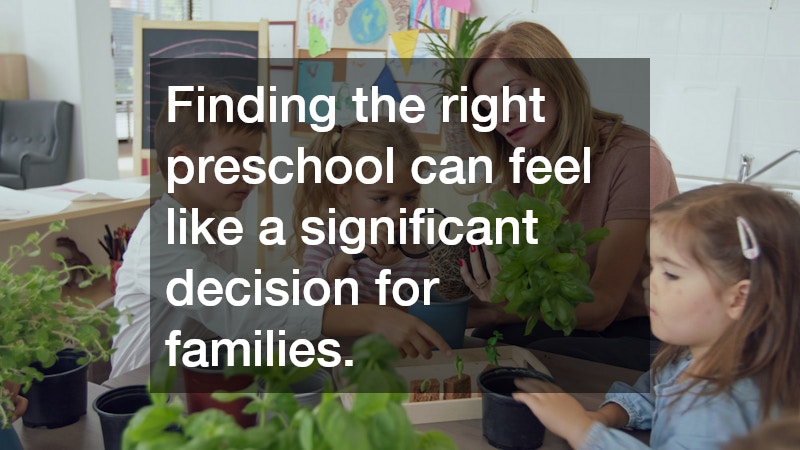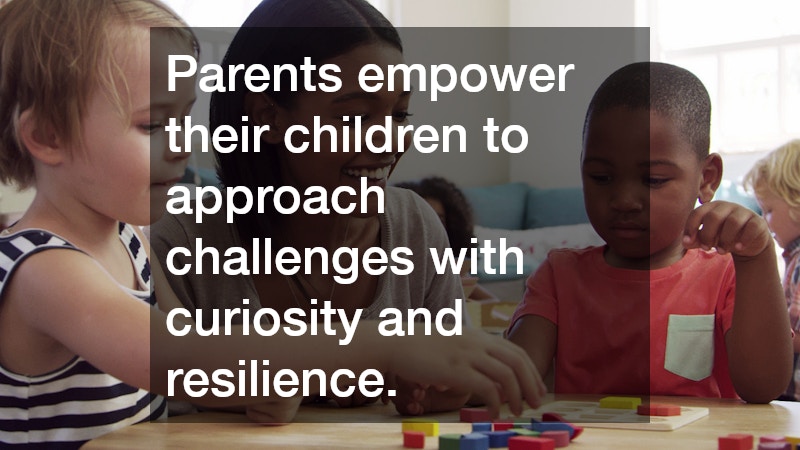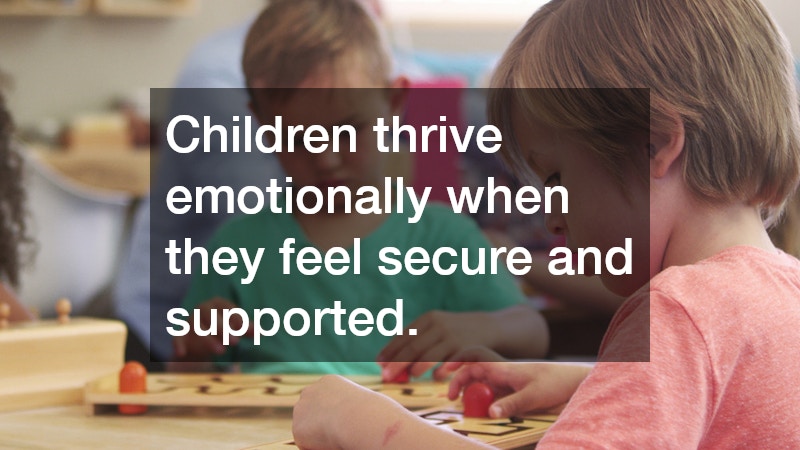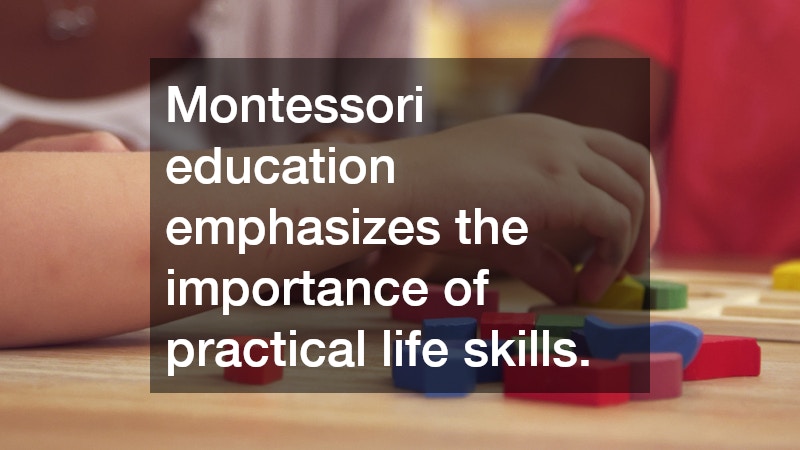The early years of a child’s education are among the most formative, shaping their attitude toward learning, independence, and creativity. A preschool that nurtures curiosity, encourages exploration, and builds self-confidence can set the stage for lifelong success. Montessori education has long been recognized for its focus on individualized learning and hands-on discovery, where children are encouraged to learn at their own pace within a supportive environment.
Finding the right preschool can feel like a significant decision for families. Parents seek a balance between academic readiness, emotional growth, and joyful exploration. A well-rounded early education program provides that foundation—helping children develop cognitive, social, and emotional skills that will serve them for years to come.
Creating a Strong Learning Foundation Through Exploration and Independence
Montessori education prioritizes exploration and independence, encouraging children to take charge of their learning journey. Unlike traditional classrooms where lessons are teacher-directed, Montessori environments are child-centered, allowing students to explore activities that capture their interest.
The best Montessori preschools understand that learning begins with curiosity. Classrooms are intentionally designed to promote self-discovery through tactile materials, real-world tasks, and guided observation. These schools help children strengthen fine motor skills, problem-solving abilities, and concentration—all while developing confidence in their capabilities.
Parents often compare Montessori programs with the best private preschools because both emphasize small class sizes, individualized instruction, and nurturing teacher-student relationships. However, Montessori education goes further by integrating learning into everyday life.
When choosing the right school, consider the following:
- Observe the classroom environment. Look for accessible shelves, child-sized furniture, and natural materials that invite hands-on interaction.
- Ask about teacher credentials. Certified Montessori educators are trained to guide rather than direct, allowing children to make meaningful choices.
- Watch for mixed-age classrooms. Montessori schools often group children by developmental stage, not age, promoting mentorship and social balance.
By focusing on independence early, parents empower their children to approach challenges with curiosity and resilience.

Encouraging Active Learning Beyond the Classroom
A well-rounded education extends beyond academics. Physical activity is crucial for developing coordination, confidence, and focus—all essential components of holistic learning. Many preschools encourage participation in swim lessons or swimming classes to complement classroom growth.
Swimming offers unique developmental benefits for young learners. It improves balance, muscle control, and endurance while teaching discipline and patience. Moreover, swimming helps children understand water safety from an early age, a life skill that promotes both independence and responsibility.
Parents can support active learning by incorporating movement-based routines at home. Simple practices—like family walks, dance time, or outdoor play—reinforce lessons learned in physical activities.
Practical tips for encouraging physical growth:
- Enroll early. Young children often adapt to water more easily and develop lifelong comfort through structured swimming programs.
- Prioritize safety. Choose certified instructors and facilities with proper lifeguard supervision.
- Celebrate progress. Track milestones, such as swimming a short distance or floating independently, to build self-esteem.
Physical education and Montessori learning share a common goal: helping children master coordination and self-awareness through movement and exploration.
Supporting Emotional and Social Development at Every Stage
Children thrive emotionally when they feel secure and supported. Teachers at the best Montessori preschools recognize that emotional development is as important as academic learning. Montessori classrooms are structured to promote empathy, collaboration, and mutual respect.
Life circumstances, however, can influence a child’s emotional landscape. Families experiencing change—such as separation or custody adjustments—may face additional challenges. Consulting a family law attorney can help parents navigate these transitions with clarity and confidence, ensuring that decisions prioritize the child’s well-being.
Educators can play an essential role during such periods by maintaining consistency, offering comfort, and fostering open communication. When children understand that they are supported both at home and at school, they are more likely to adapt positively and continue learning effectively.
Parents can reinforce emotional growth by:
- Encouraging communication. Allow children to express feelings openly without judgment.
- Modeling empathy. Demonstrate kindness and understanding in daily interactions.
- Creating routines. Predictable structures at home and school help children feel secure during times of change.
Social and emotional resilience builds the foundation for self-assurance—a quality that helps children navigate challenges with grace.
Nurturing Creativity and Imagination in Daily Learning
Creativity is the heart of a Montessori education. Art, music, and imaginative play allow children to explore emotions, express individuality, and develop problem-solving skills. Encouraging creative projects throughout the year helps children connect learning with joy. Montessori classrooms often include designated art corners, music areas, and hands-on materials that inspire curiosity and self-expression. When children are encouraged to create freely, they develop not only artistic ability but also confidence, empathy, and critical thinking—qualities that extend far beyond the classroom.
Seasonal activities, such as preparing for christmas photo sessions, can serve as meaningful opportunities to blend creativity and community. Schools often organize art-based events where children craft decorations, write holiday cards, or participate in themed storytelling. These experiences teach collaboration, patience, and the joy of giving. Families can extend these moments at home by setting up simple art projects that reflect the season—painting ornaments, baking together, or designing handmade gifts. Such activities strengthen family bonds while reinforcing lessons learned in the classroom.
Incorporating creativity into education also enhances cognitive flexibility. Through art and imaginative exploration, children learn to see multiple perspectives and develop innovative thinking skills essential for success in an evolving world. Creativity fosters problem-solving because it encourages experimentation and resilience. When children make mistakes in art, they learn to adapt and find new solutions—valuable lessons applicable to academics and life.
Ideas to encourage creativity at home:
-
Provide open-ended materials such as paper, clay, fabric scraps, and recycled items for free exploration.
-
Encourage sensory play with music, textures, and nature-based crafts.
-
Host family art showcases to display children’s work and boost their sense of pride.
-
Incorporate creative expression into daily life—draw grocery lists, sing cleanup songs, or tell stories at bedtime.
-
Celebrate effort and originality, focusing on the creative process rather than the final product.
When parents and teachers nurture imagination, they create joyful learners who approach education as an adventure. A creativity-rich environment empowers children to think independently, express their ideas with confidence, and view challenges as opportunities to innovate. Over time, these experiences shape adaptable, compassionate, and forward-thinking individuals ready to make meaningful contributions to their world.

Building Essential Life Skills Through Organization and Responsibility
Montessori education emphasizes the importance of practical life skills—small yet significant habits that promote responsibility and independence. Organizing, cleaning, and caring for materials teach children discipline while giving them a sense of accomplishment. These foundational lessons go beyond tidiness; they nurture problem-solving, self-control, and respect for one’s surroundings. When children are encouraged to manage their own space, they gain a sense of purpose and confidence that positively influences all areas of learning.
Many classrooms use structured systems, such as labeled storage containers, to teach sorting, categorizing, and self-management. Each material has its place, teaching students to return items after use and maintain a clean workspace. This order helps minimize distractions and supports focused learning—a principle easily applied at home. Parents can mirror these methods by setting up organized shelves, accessible toy bins, or color-coded boxes for different activities. Such systems make it easier for children to find what they need, complete tasks independently, and understand the value of maintaining structure.
The best private preschools often mirror this approach, incorporating real-world activities like setting tables, watering plants, or managing classroom supplies. These exercises build patience, coordination, and order while reinforcing the connection between effort and reward. Children begin to understand that their actions contribute to the larger environment—a vital lesson in teamwork and community responsibility.
Ways to develop organizational habits:
-
Create dedicated play zones with labeled bins for toys, books, or art materials.
-
Encourage participation in daily cleanup routines at consistent times each day.
-
Rotate toys and learning materials to keep children engaged and prevent clutter.
-
Use visual cues like picture labels or color codes for non-readers to recognize storage areas.
-
Praise effort over perfection to instill intrinsic motivation and pride in responsibility.
When children learn to manage their surroundings, they internalize order as a form of respect—both for themselves and for others. Parents who model and support these habits help foster independence, focus, and self-discipline. Over time, these seemingly small routines evolve into essential life skills that prepare children to navigate academic challenges and personal responsibilities with confidence and care.

Promoting Health, Wellness, and Early Intervention
A child’s physical health plays a vital role in their ability to learn effectively. Routine checkups, preventive care, and early intervention ensure that developmental milestones are met on time. Beyond routine visits, parents should be attentive to subtle changes in behavior, energy levels, or sensory responses, as these can indicate underlying health concerns that may impact learning.
Hearing and oral health are two areas that can significantly influence a child’s educational experience. Regular visits to an audiologist help detect potential hearing issues early, preventing communication challenges that could affect speech, language acquisition, and social development. Children with undiagnosed hearing difficulties may struggle to follow instructions, participate in group activities, or build confidence in classroom interactions. Similarly, a pediatric dentist monitors oral hygiene, addressing cavities, gum problems, or alignment issues before they cause discomfort or distraction during learning activities. Healthy teeth and gums support proper nutrition, clear speech, and overall well-being.
Health tips for preschool-aged children:
-
Schedule dental checkups every six months to maintain oral health.
-
Have hearing evaluations if your child frequently says “what?” or turns up the volume excessively.
-
Encourage balanced meals rich in fruits, vegetables, and whole grains.
-
Promote proper hydration and consistent sleep patterns to optimize energy and focus.
-
Foster self-care habits like brushing teeth, washing hands, covering coughs, and practicing safe hygiene routines.
-
Monitor vision and physical activity, as both impact coordination and classroom participation.
Healthy children are confident learners. When parents and educators collaborate to monitor wellness and address concerns proactively, they support both academic performance and emotional growth, laying a strong foundation for lifelong learning and overall development.
Partnering With Educators and the Community for Long-Term Success
A child’s success depends not only on what happens in the classroom but also on the strength of partnerships between parents, educators, and the community. The best Montessori preschools prioritize open communication, inviting parents to engage in discussions about progress, behavior, and development.
Community-based programs, such as swim lessons, provide valuable opportunities for teamwork and confidence-building. These activities also teach children to manage goals, practice patience, and experience the satisfaction of improvement through persistence.
Tips for maintaining strong school partnerships:
- Attend parent-teacher conferences and participate in classroom activities.
- Volunteer during community events or fundraisers.
- Join parent advisory groups or support committees.
- Stay informed about your child’s daily experiences to reinforce learning at home.
When families and schools work together, children receive consistent guidance that strengthens their academic, emotional, and social foundations.
Preparing Children for the Transition to Elementary Education
The transition from preschool to elementary school marks an exciting milestone. It’s a period filled with anticipation, growth, and adjustment. The best private preschools prepare children for this change by emphasizing readiness skills—attention span, listening, and self-regulation.
Organizational tools, like using storage containers for school materials, help children learn to manage personal items and maintain order in their new classroom environment. Teaching these habits early reduces stress during the transition to more structured learning. Beyond organization, fostering independence is key. Encourage children to take on small responsibilities, such as putting away their belongings, following a morning routine, or completing simple chores, to build confidence and self-sufficiency.
Social readiness is equally important. Engage your child in group activities, playdates, or cooperative games that require sharing, turn-taking, and listening to others. These experiences strengthen interpersonal skills and ease the adjustment to a larger classroom setting.
Ways to ease the transition:
-
Visit the new school ahead of time to familiarize your child with the setting.
-
Practice simple routines like packing a backpack or setting out clothes.
-
Read books about starting kindergarten to build confidence and excitement.
-
Encourage problem-solving and decision-making skills through age-appropriate tasks.
-
Keep communication open with teachers to monitor adjustment and progress.
By blending practical preparation with emotional reassurance and social skill-building, parents can make this pivotal stage a positive, empowering, and confidence-boosting experience for their children.
Early education is about more than learning numbers and letters—it’s about nurturing a love of discovery, independence, and connection. Montessori-inspired schools create environments where children feel safe to explore, make mistakes, and celebrate their progress.
Parents who seek thoughtful, well-rounded education give their children the tools to thrive academically, socially, and emotionally. With the right foundation, every child can build a bright future filled with curiosity, creativity, and confidence.
Choosing a preschool that aligns with your family’s values and your child’s learning style is one of the most meaningful investments you can make. Through supportive teachers, enriching experiences, and engaged communities, young learners can embark on their educational journey with joy and purpose.

